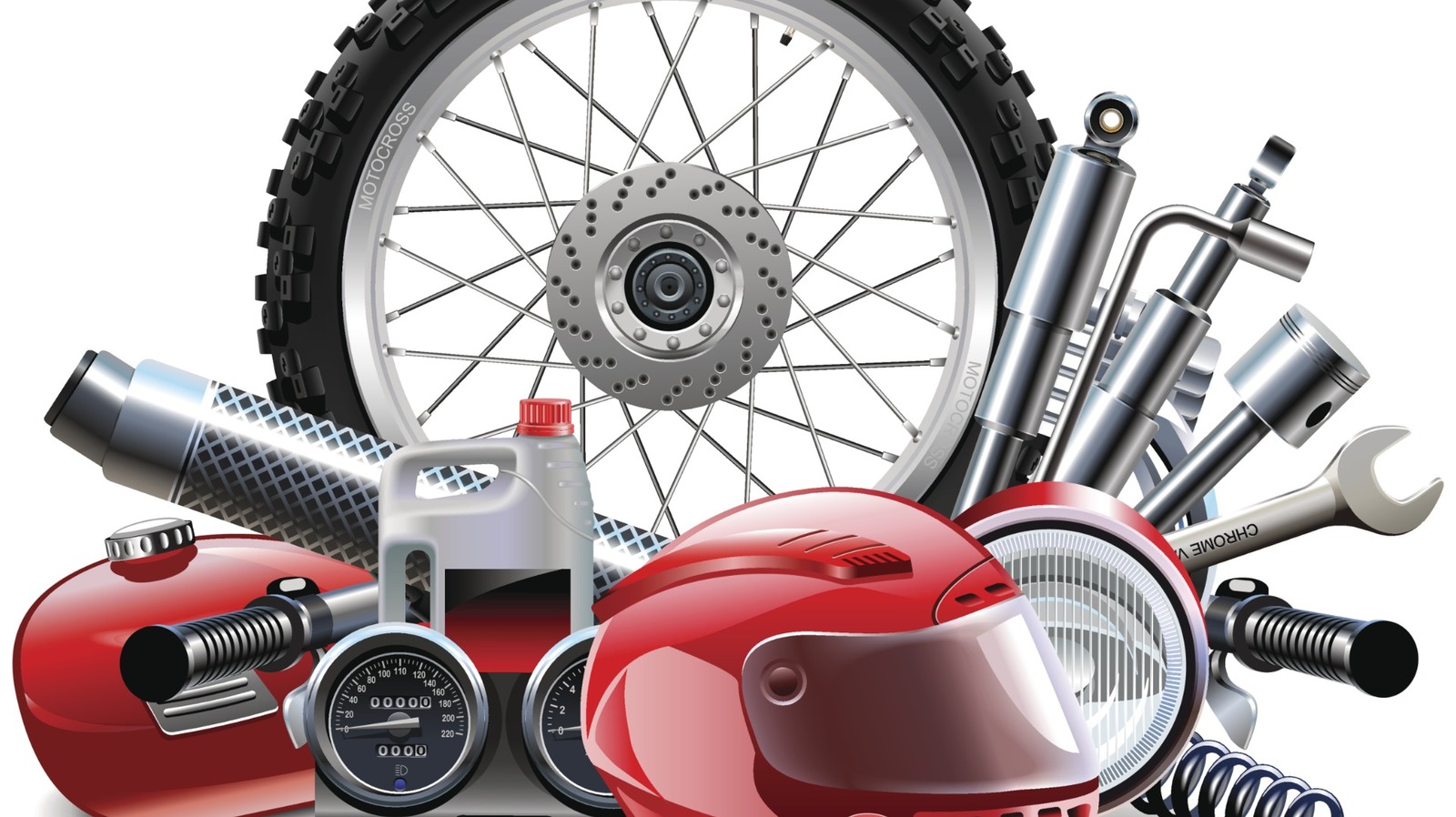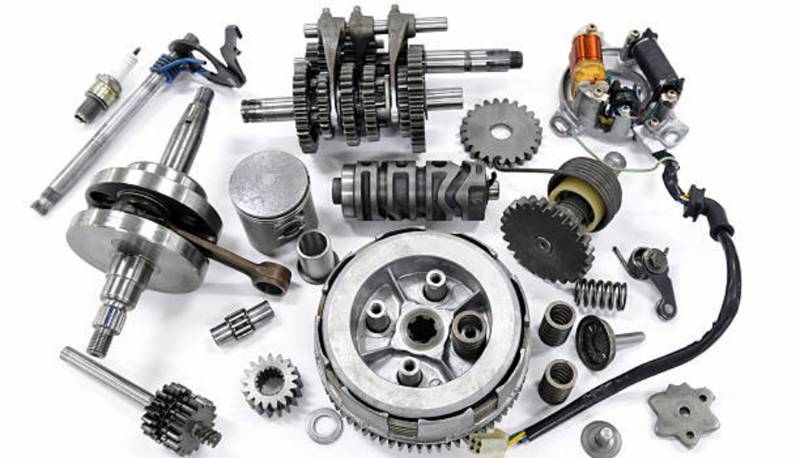Discover the Important MotorBike Parts You Need for Ideal Efficiency
Recognizing the vital parts of a motorcycle is fundamental for attaining peak performance. Each element, from the engine to the stopping system, plays a vital role in general functionality and security. Routine maintenance can protect against unforeseen failures and enhance the riding experience. Several riders neglect the ins and outs of these systems. Uncovering how they collaborate can lead to a more effective trip. What crucial parts should every motorcyclist focus on?
The Engine: The Heart of Your Bike
The engine acts as the core element of a motorbike, driving its efficiency and defining its capacities. It is in charge of transforming fuel right into power, which powers the bike forward. Different sorts of engines are employed, including single-cylinder, V-twin, and inline arrangements, each offering distinctive characteristics fit for various riding objectives and designs. The engine dimension, typically determined in cubic centimeters (cc), substantially affects performance, with bigger engines normally providing more power and torque.Furthermore, the engine's style and innovation, such as gas injection systems or air-cooling versus liquid-cooling, affect effectiveness and dependability. Maintenance is vital for peak operation; aspects like normal oil adjustments and checking stimulate plugs warranty durability. Cyclists usually consider an engine's responsiveness and smoothness, as these characteristics boost the general riding experience. Ultimately, the engine remains an essential aspect that specifies not only the bike's efficiency however likewise the motorcyclist's connection to the maker.
The Transmission: Shifting Gears Smoothly
The transmission plays a crucial duty in a motorcycle's performance, specifically in the technicians of equipment changing. Comprehending how to move equipments efficiently can enhance the total riding experience, while normal upkeep guarantees peak performance. Correct focus to these facets can greatly influence the long life and effectiveness of the bike.

Gear Shifting Mechanics
Smooth gear shifting is vital for excellent motorcycle performance, greatly impacting both velocity and control. The auto mechanics of equipment moving include the communication in between the clutch, gear lever, and transmission system. When a cyclist involves the clutch, it disengages the engine from the transmission, allowing for a gear change without harming the parts. A well-timed launch of the clutch, incorporated with accurate movement of the gear lever, assists in a seamless change in between equipments. This procedure guarantees that the engine operates within its ideal power band, improving performance. Motorbike Components NZ. Additionally, recognizing the equipment ratios and their impact on speed and torque can assist bikers make informed choices during changes, eventually adding to a more satisfying and responsive riding experience
Upkeep Tips Importance
Regular upkeep plays a crucial role in ensuring that the transmission system runs efficiently, enabling for smooth equipment shifts. On a regular basis inspecting and altering the transmission liquid is essential, as old liquid can lead to increased rubbing and wear. Additionally, inspecting the clutch for wear warranties peak involvement and disengagement, avoiding slippage during gear changes. Lubrication of relocating parts is similarly crucial to reduce friction and improve efficiency. Motorcycle owners need to likewise check for leakages and unusual sounds, as these can indicate underlying concerns. By adhering to these maintenance tips, cyclists can extend the life-span of their transmission system, guaranteeing that equipment changes continue to be smooth and adding to the general performance of their motorbike.
The Braking System: Ensuring Security on Every Experience
Braking systems are essential parts that directly affect a motorcycle's safety and performance. They contain various components, including brake pads, blades, calipers, and hydraulic lines, all interacting to ensure reliable slowdown. The sort of stopping system-- usually either disc or drum-- affects responsiveness and stopping power.Regular upkeep is important to promote peak efficiency; worn brake pads can result in lowered efficiency and boosted stopping ranges. In addition, the top quality of brake liquid must be kept an eye on, as it can soak up wetness in time, compromising stopping efficiency.Riders should likewise take into consideration the significance of anti-lock braking systems (ABDOMINAL), which prevent wheel lockup during sudden quits, boosting general security. Properly operating brakes are not just about stopping; they infuse self-confidence in the cyclist, permitting much safer navigating with numerous terrains. Inevitably, a dependable stopping system is critical for taking pleasure in every ride with satisfaction.
The Suspension: Enhancing Convenience and Control
A well-functioning shock absorber greatly adds to a motorcycle's total efficiency, complementing the performance of the braking system. The suspension plays a substantial duty in absorbing shocks from unequal surface areas, guaranteeing a smoother ride while preserving tire contact with the roadway. This get in touch with is vital for both security and control, enabling motorcyclists to navigate edges with confidence and precision.Different sorts of shock absorber, such as telescopic forks or mono-shocks, provide differing levels of comfort and handling. Appropriately tuned suspension boosts responsiveness, offering the biker with an extra connected feel to the motorbike. Routine upkeep checks are vital to identify the suspension parts, including dampers and springs, are functioning at their ideal. An efficient suspension system not only boosts the riding experience yet also adds to the durability of other motorcycle components by decreasing damage. Therefore, purchasing top quality suspension is crucial for any severe motorcycle enthusiast.
The Tires: Attaching You to the Roadway
Tires play a crucial function in a motorbike's performance, functioning as the main web link in between the roadway and the cyclist. Comprehending the various sorts of tires readily available can substantially affect taking care of and safety. In addition, regular maintenance is essential to assure peak tire performance and durability.
Tire Keys In Explained
Just how do various tire kinds influence a motorcycle's performance? Tire types play an essential duty in determining a motorcycle's security, handling, and grasp. Sport tires, made for high efficiency, offer enhanced grip and responsiveness on paved roads, making them ideal for racing and aggressive riding. On the other hand, exploring tires focus on longevity and convenience, giving a smoother trip for long-distance traveling. Off-road tires, defined by their rugged walk patterns, succeed in traction on unpaved surface areas, suitable for adventure lovers. In addition, dual-sport tires mix features from both off-road and on-road categories, providing to functional riding demands. Ultimately, selecting the best tire type is essential for optimizing efficiency, guaranteeing security, and enhancing the overall riding experience.
Maintenance Tips Offered
While riding when driving, maintaining perfect tire condition is important for security and performance. Consistently checking tire stress is essential, as under-inflated tires can lead to poor handling and boosted wear. It is advisable to evaluate tread depth regularly; worn tires concession hold and stability. In addition, cyclists must look for indicators of damages, such as splits or lumps, which can indicate the need for replacement. Rotating tires periodically assures even use, enhancing longevity. Maintaining tires tidy from particles and avoiding excessive curbs can lengthen their life-span. Maintaining proper placement and equilibrium contributes to peak performance, reducing stress on other bike components. Sticking to these upkeep pointers will substantially boost the total riding experience.
The Gas System: Sustaining Efficiency and Efficiency
The fuel system plays a crucial duty in taking full advantage of a motorbike's efficiency and performance, as it ensures the optimum distribution of fuel to the engine. It comprises several crucial elements, consisting of the fuel container, fuel pump, fuel filter, and gas injectors or carburetor. Each component has to operate properly to guarantee a smooth and effective ride.The gas container stores gasoline and supplies it to the engine using the gas pump, which generates the needed pressure. A gas filter stops impurities from getting in the engine, while the injectors or carburetor mix gas with air for combustion.Proper upkeep of the gas system is essential; a clogged filter or malfunctioning injector can lead to decreased performance and increased fuel usage. By validating that the gas system operates efficiently, motorcyclists can take pleasure in better throttle reaction, much better gas economy, and on the whole boosted riding experience.
The Electrical System: Powering Your Adventure
An efficient electric system is necessary for the general functionality and safety of a motorcycle, as it powers crucial components such as the ignition, lights, and various digital systems. This system includes the battery, which shops energy, and the alternator, liable for generating power while the engine runs. The wiring harness connects these elements, making certain dependable power distribution.Additionally, integrates secure the system from overloads, while relays aid manage high-current gadgets with low-power signals. A well-maintained electrical system boosts efficiency by ensuring smooth begins and constant procedure of lights and signals, vital for biker visibility and safety.Regular checks of the battery's fee and connections are very important for avoiding electrical failures. Bikers should likewise check electrical wiring for damage, ensuring all components function ideally. Eventually, a durable electrical system contributes considerably to the total performance and reliability of the motorcycle.
Frequently Asked Inquiries
Just how Typically Should I Change My Motorcycle's Battery?
The regularity of motorcycle battery replacement relies on use and upkeep (Bike Parts Wellington). Normally, batteries should be changed every Bike Parts Wellington 3 to 5 years. Routine checks can help identify when a substitute is essential for peak performance
What Devices Do I Need for Standard Bike Upkeep?
For standard motorbike upkeep, one calls for essential tools such as a socket set, wrenches, screwdrivers, pliers, tire stress gauge, and a torque wrench. These devices facilitate reliable maintenance and guarantee the bike runs effectively and safely.
How Can I Improve My Motorcycle's Aerodynamics?
To improve bike the rules of aerodynamics, one ought to take into consideration changing fairings, using windshield extensions, maximizing body setting, and minimizing general weight. These adjustments help lessen drag, improving stability and gas effectiveness throughout trips.
What Are the Indicators of a Failing Electric System?
Indicators of a failing electric system include dimming lights, difficulty starting, irregular tool analyses, and blown integrates. Bike Parts Wellington. Unusual scents or corrosion around battery terminals may additionally suggest underlying concerns requiring instant focus for safety and security and performance

How Do I Pick the Right Oil for My Motorbike?
When selecting oil for a bike, one need to think about the manufacturer's requirements, thickness rankings, and the sort of riding. In addition, conventional versus synthetic oil can influence efficiency and engine defense, influencing the decision considerably. The engine size, generally measured in cubic centimeters (cc), considerably affects efficiency, with bigger engines generally providing more power and torque.Furthermore, the engine's style and technology, such as gas injection systems or air-cooling versus liquid-cooling, influence efficiency and dependability. A well-functioning suspension system significantly adds to a motorbike's general performance, enhancing the efficiency of the braking system. The fuel system plays a vital function in making best use of a motorbike's performance and performance, as it guarantees the optimal distribution of gas to the engine. A gas filter avoids pollutants from entering the engine, while the injectors or carburetor mix fuel with air for combustion.Proper maintenance of the gas system is crucial; a stopped up filter or malfunctioning injector can lead to decreased efficiency and raised gas consumption. A well-maintained electric system improves efficiency by making certain smooth beginnings and constant operation of lights and signals, vital for motorcyclist exposure and safety.Regular checks of the battery's cost and connections are vital for preventing electrical failures.